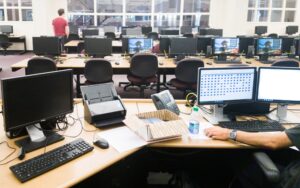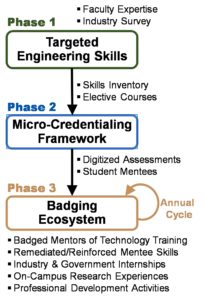BC-Eco: A Scalable Educational Ecosystem for Building STEM Capacity
The Building-the-Capacity Ecosystem (BC-Eco) project proposes to leverage digitized assessments that automate micro-credentialing of student skills to facilitate personalized tutoring, peer-mentorship, and internships within a culturally-relevant pedagogy. The project will include courses in eight-degree programs in engineering as well as computer science, mathematics, chemistry, biology, and physics. BC-Eco components form an interdependent flow facilitating the support, advancement, and retention of underrepresented undergraduate students in STEM.

Evidence-Based and Knowledge-Generating Approach
Layer 1: Credentialing Services Component
BC-Eco’s foundational layer utilizes a novel digitized assessment and micro-credentialing techniques. Digitized assessments will leverage UCF’s Evaluation and Proficiency Center (EPC). It recasts GTA and faculty roles of labor-intensive tasks towards high-gain learning activities via digital resources, auto-grading, and post-test remediation utilizing scanned-in scratch sheets.
Automated Micro-Credentialing
Micro-credentialing is an emerging means to authenticate an achievement, accomplishment, or even readiness to advance. The BC-Eco micro-credentialing process will commence as students complete coursework and answer digitized questions

while conducting their assessments. The digitized assessments already completed in the EPC will be input to Python scripts to be developed by the Investigator team. Specifically, we will define, deliver, and refine STEM micro-credentials through the annual cycle. Micro-credentials will be disbursed to students upon completion of coursework, research experiences, and internships.
Layer 2: Peer-Tutoring Component
Fostering metacognition, defined as “thinking about thinking”, can be challenging within STEM fields. Herein, more frequent metacognitive activities at a significant scale will be addressed within BC-Eco. In the proposed BC-Eco project, learners will engage in guided peer-facilitated metacognition to review and discuss solutions to incorrect answers on machine-graded assessments. During these “Score Clarification” tutoring sessions in the EPC, students are actively engaged in metacognition as they self-assess and discuss the rationale and decision processes considered in their answers. When a learner orally expresses thinking about a solution to a problem, there is increased awareness of the learning processes involved.
Layer 3: Experiential Learning Component
The BC-Eco approach will feature an internship program to provide students with the opportunity to engage in research internship and training opportunities that will complement their academic research training. Students will acquire professional development experience that will enhance their preparation for the various career pathways after graduation. The opportunity will encourage the participation of students from groups that have traditionally been underrepresented and underserved in STEM. Within BC-Eco, internships are experiential learning activities to increase learners’ self-efficacy in STEM while providing financial support towards their undergraduate degree, thus bridging a financial gap for underrepresented populations in HSIs. Thus, BC-Eco contributes towards national needs for creating and evaluating exemplars for building capacity through innovative learning ecosystems to advance learning in STEM.